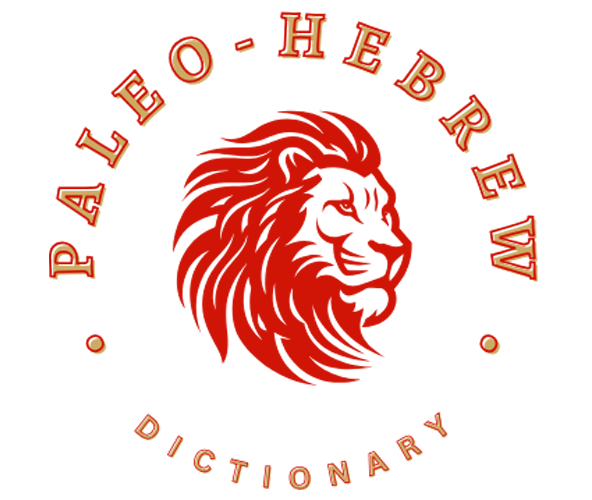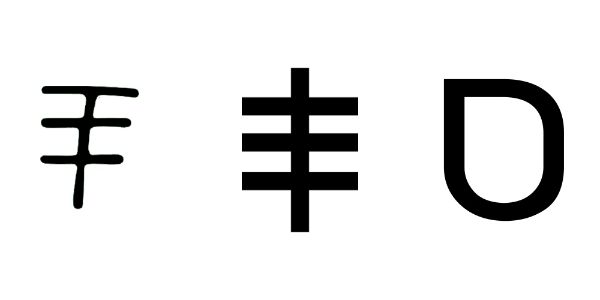The word yaphat (𐤉𐤐𐤕) or “Japheth” is associated with three associated meanings. The first meaning is that of a combination of 𐤉 (Ya) and 𐤐𐤕𐤄 (phatah), which means enlarge or expansion and could mean that his name means “He enlarges” or “Yah enlarges”. The second meaning is connected to 𐤉𐤐𐤄 (yaphah) meaning to be fair or beautiful. The last association of the word is with the eldest or first 𐤁𐤍 (ban) of 𐤍𐤅𐤇 (Nauakh).
𐤉𐤐𐤕 (Yaphat) is the eldest or first 𐤁𐤍 (ban) of 𐤍𐤅𐤇 (Nauakh) who was given the following lands by his father when he divided the earth: a portion of Russia beginning at the border of Georgia, through Greece, Italy, Spain, and Portugal. The border stretches to the upper portion of North America and Canada.
He is the father of 𐤂𐤌𐤓 (Gamar), 𐤌𐤂𐤅𐤂 (Magauag), 𐤌𐤃 (Mad) / 𐤌𐤃𐤉 (Maday), 𐤉𐤅𐤍 (Yauan), 𐤕𐤅𐤁𐤋 (Tauabal), 𐤌𐤔𐤊 (Mashak), and 𐤕𐤉𐤓𐤎 (Tayaras). He is the progenitor of the indigenous Greeks, Celts, Medes, and other predecessors to the European people. They are classified as European and Euro-Asiatic; with Europeans having intermixed with the 𐤀𐤃𐤅𐤌𐤉𐤌 (Adauamayam).
The Paleo-Hebrew language or the original language of the Ābarayam is one spoken with an emphasis on the rauakh (breath, wind, spirit). With the language of the Ābarayam, each letter has a meaning and a number associated with it that adds meaning to each word they’re used with. Below you will be able to learn more about the letter in Ancient Hebrew, Yiddish Hebrew, Greek, and much more.
Letter Meanings
| Letter | Meaning |
|---|---|
| 𐤉 (y) – ya | arm, hand, work, thrust, deed, make, throw, worship Prefix: he/she, turns a word third person |
| 𐤐 (ph) – pha | mouth, word, speak, edge, sword, scatter, blow |
| 𐤕 (t) – ta | mark, sign, covenant, signature, identification of people, places, or things Suffix: turns a word into the feminine counterpart of a masculine word. |
| Ābarayat Number | 490 = 10 (y) + 80 (ph) + 400 (t) |
| Hebrew Gematria | |
| English Gematria | |
| Simple Gematria |
Based on the meaning of the letters the word could be defined as:
- “work of sword of covenant”
- “work to scatter covenant”
- “work to speak of covenant”
- “creation of sword of covenant”
- “worship of sword of covenant”
- “worship of scattered covenant”
- “worship of spoken covenant”
Definitions for 𐤉𐤐𐤕 / yaphat
| Language | Word | Transliteration | Pronunciation | Definition |
|---|---|---|---|---|
| Ābarayat | 𐤉𐤐𐤕 | yaphat | yah’-fat | the firstborn son of Nauakh, also the father of Gamar, Magauag, Maday, Yauan, Tauabal, Mashak, and Tayaras. |
| English | Japheth | Japheth | jey-fith | son of Noah. Genesis 5:32. |
| Hebrew | יֶפֶת | Yepheth | yeh’-feth | a son of Noah |
| Arabic | جميل | jamil | jah-meel | lovely, beautiful, nice, pretty, fine, favor |
| Greek | Ἰάφεθ | Iápheth | aya-fet | Yafeth |
In the Scriptures
He first appears in the Ābaray scriptures as one of the three 𐤁𐤍𐤉𐤌 (banayam) of 𐤍𐤅𐤇 (Nauakh), saved from the Flood through the Ark. In the Book of 𐤁𐤓𐤀𐤔𐤉𐤕 (BaRaashayat), they are always in the order “Shem, Ham, and Japheth” when all three are listed. However, 𐤁𐤓𐤀𐤔𐤉𐤕 (BaRaashayat) 9:24 calls 𐤇𐤌 (Kham) the youngest, and 𐤁𐤓𐤀𐤔𐤉𐤕 (BaRaashayat) 10:21 refers ambiguously to 𐤔𐤌 (Sham) as “brother of Japheth the elder,” which could mean that either is the eldest. Most modern writers accept Shem-Ham-Japheth as reflecting birth order, but this is not always the case in the scriptures.
Following the Flood, he is featured in the story of 𐤍𐤅𐤇 (Nauakh)’s drunkenness. 𐤇𐤌 (Kham) sees their father drunk and naked in his tent and tells his brothers, who then cover their father with a cloak while avoiding the sight; when 𐤍𐤅𐤇 (Nauakh) awakes he curses 𐤊𐤍𐤏𐤍 (Kanaān), the son of 𐤇𐤌 (Kham), and blesses 𐤔𐤌 (Sham) and 𐤉𐤐𐤕 (Yaphat): “Blessed be the Lord God of Shem and may Canaan be his slave; and may God enlarge Japheth and may he dwell in the tents of Shem, and may Canaan be his slave!”
The Wife of 𐤉𐤐𐤕 (Yaphat)
The Book of 𐤉𐤅𐤁𐤋 (Yauabal) says his original 𐤀𐤔𐤄 (ashah)’s name was ‘Adataneses but claims have been made that his 𐤀𐤔𐤄 (ashah)’s name is Rayneh. She gave birth to his children named 𐤂𐤌𐤓 (Gamar), 𐤌𐤂𐤅𐤂 (Magauag), 𐤌𐤃 (Mad) / 𐤌𐤃𐤉 (Maday), 𐤉𐤅𐤍 (Yauan), 𐤕𐤅𐤁𐤋 (Tauabal), 𐤌𐤔𐤊 (Mashak), and 𐤕𐤉𐤓𐤎 (Tayaras).
The attribution of his 𐤀𐤔𐤄 (ashah)’s name ‘Adataneses is based on the text stating “And Ham knew that his father had cursed his younger son, and he was displeased that he had cursed his son. and he parted from his father, […] And he built for himself a city and called its name after the name of his wife Ne’elatama’uk. And Japheth saw it, and became envious of his brother, and he too built for himself a city, and he called its name after the name of his wife ‘Adataneses.” Since the Book of 𐤉𐤅𐤁𐤋 (Yauabal) says that he named the territory after her then we have to assume her legitimate name is ‘Adataneses; which means “Gift”.
Both the name ‘Adataneses, and the name Rayneh (Rayanah) hold no clear meaning in Ābarayat. Since everyone spoke the same language prior to the Tower of Babel the name of his 𐤀𐤔𐤄 (ashah) should have some type of meaning in the language. However, Rina is a derivative of the name 𐤓𐤉𐤍𐤄 (Rayanah). Rina has its roots in Latin, Greek, Hebrew, and Israeli, and Rina means “beloved; peace; pure; queen; melody; joyful”. Rina is a variant form of Carina (Latin). Rina is also a variant of Irene (Greek). Mythology: Greek goddess of peace. Rina is also used as a form of Katherine (Greek), a form of Regina (Latin), a variation of Rena (Hebrew), and a derivative of Rinah (Israeli).
It is said that Rayneh worked closely with her mother-in-law, sketching the ark’s animals while studying and recording their habits. In her limited free time, she enjoyed making crafts and adding some flair to her family’s surroundings, such as painting intricate designs on pottery.
The Great Expansion
His descendants kept true to the promise of their lands being enlarged. However, it started with the Romans who are a mixture of his descendants the 𐤊𐤕𐤉𐤌 (Katayam), and a descendant group of 𐤔𐤌 (Sham) known as the 𐤀𐤃𐤅𐤌𐤉𐤌 (Adauamayam). However, the expansion grew exponentially when the Trans-Atlantic Slave Trade began and they colonized both 𐤇𐤌 (Jham)’s and 𐤔𐤌 (Sham)’s territories and lands, which was against the allotments of 𐤍𐤅𐤇 (Nauakh). The Trans Atlantic Slave Trade occurred through:
Colonization of Africa – Trans-Atlantic Slave Trade
- Italy and the Roman Catholic Church
descendants of 𐤊𐤕𐤉𐤌 (Katayam), 𐤕𐤉𐤓𐤎 (Tayaras), and 𐤀𐤃𐤅𐤌𐤉𐤌 (Adauamayam) - Spain and Portugal
descendants of 𐤊𐤕𐤉𐤌 (Katayam), 𐤕𐤉𐤓𐤎 (Tayaras), 𐤕𐤓𐤔𐤉𐤔 (Tarashayash), and 𐤀𐤃𐤅𐤌𐤉𐤌 (Adauamayam) - Great Britain
descendants of 𐤀𐤔𐤊𐤍𐤆 (Ashakanaz) and 𐤓𐤉𐤐𐤕 (Rayaphat) - France (Gauls, Romans, and Germans)
descendants of the 𐤂𐤌𐤓 (Gamar), 𐤊𐤕𐤉𐤌 (Katayam), 𐤀𐤃𐤅𐤌𐤉𐤌 (Adauamayam), and 𐤀𐤔𐤊𐤍𐤆 (Ashakanaz) - Germany
descendants of 𐤂𐤌𐤓 (Gamar) and 𐤀𐤔𐤊𐤍𐤆 (Ashakanaz) - Belgium
descendants of 𐤓𐤉𐤐𐤕 (Rayaphat)
Colonization of the Americas – Trans Atlantic Slave Trade
- Spain and Portugal
descendants of 𐤊𐤕𐤉𐤌 (Katayam), 𐤕𐤉𐤓𐤎 (Tayaras), 𐤕𐤓𐤔𐤉𐤔 (Tarashayash), and 𐤀𐤃𐤅𐤌𐤉𐤌 (Adauamayam) - France (Gauls, Romans, and Germans)
descendants of the 𐤂𐤌𐤓 (Gamar), 𐤊𐤕𐤉𐤌 (Katayam), 𐤀𐤃𐤅𐤌𐤉𐤌 (Adauamayam), and 𐤀𐤔𐤊𐤍𐤆 (Ashakanaz) - Great Britain
descendants of 𐤀𐤔𐤊𐤍𐤆 (Ashakanaz) and 𐤓𐤉𐤐𐤕 (Rayaphat) - Dutch
descendants of 𐤂𐤌𐤓 (Gamar) and 𐤀𐤔𐤊𐤍𐤆 (Ashakanaz) - Russia
descendants of 𐤕𐤅𐤁𐤋 (Tauabal) and 𐤌𐤔𐤊 (Mashak)
Genealogy
Images for 𐤉𐤐𐤕 / yaphat

Maps for 𐤉𐤐𐤕 / yaphat
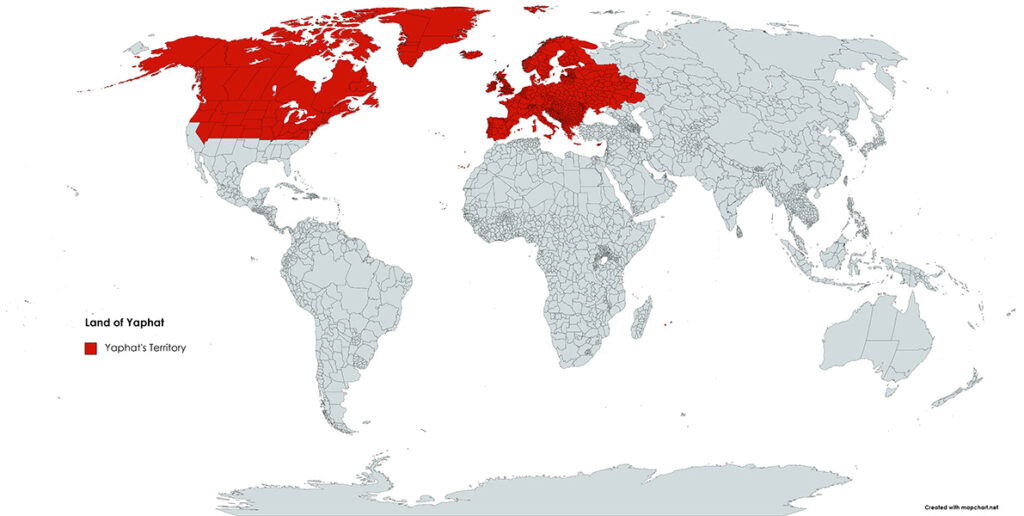
Definitions for 𐤉𐤐𐤕𐤉 / yaphatay
When adding the 𐤉 (yad) to the end of a word, it creates a possessive of the original word. It can either signify “my…” or identify a member of a nation. For example, 𐤏𐤁𐤓 (Ābar) is the progenitor, but 𐤏𐤁𐤓𐤉 (Ābaray) is the singular descendant of him also known as a Hebrew.
| Language | Word | Transliteration | Pronunciation | Definition |
|---|---|---|---|---|
| Ābarayat | 𐤉𐤐𐤕𐤉 | yaphatay | yah’-fatey | descendants of Yaphat, also a name for the Japhethites. |
| English | Japhethite | Japhethite | jey-fith -ahyte | a member of any of various ancient and modern peoples |
| Hebrew | יֶפֶתי | Yephethi | yeh’-feth-ee’ | |
| Arabic | جميل | jamil | jah-meel | lovely, beautiful, nice, pretty, fine, favor |
| Greek | Ἰάφεθ | Iápheth | aya-fet | Yafeth |
The Descendants
𐤉𐤐𐤕𐤉 (Yaphatay) or Japhethites are the descendants of 𐤉𐤐𐤕 (Yaphat) who are somewhat of a mixed multitude but are mostly known for the people who are indigenous to the colder territories of the planet including Russia through European sections such as Greece, Italy, Spain, Portugal, Britain, and others. They continue to the upper portions of the United States in North America and Canada.
They are a mixture of people intermarrying with 𐤇𐤌𐤉𐤌 (Khamayam), 𐤔𐤌𐤉𐤌 (Shamayam), and 𐤍𐤐𐤉𐤋𐤉𐤌 (Naphayalayam). Originally, the indigenous people were melanin-filled individuals, however, after years of mixing with 𐤀𐤃𐤅𐤌𐤉𐤌 (Adauamayam) from 𐤔𐤌𐤉𐤌 (Shamayam) and 𐤍𐤐𐤉𐤋𐤉𐤌 (Naphayalayam) they have gained a genetic anomaly that doesn’t allow them to produce melanin at adequate concentrations.
Images for 𐤉𐤐𐤕𐤉 / yaphatay

𐤀𐤔𐤊𐤍𐤆 (Ashakanaz) and 𐤂𐤌𐤓 (Gamar)
𐤀𐤔𐤊𐤍𐤆𐤉𐤌 (Ashakanazayam) and 𐤂𐤌𐤓𐤉𐤌 (Gamarayam)
Germans

𐤀𐤔𐤊𐤍𐤆 (Ashakanaz)
𐤀𐤔𐤊𐤍𐤆𐤉𐤌 (Ashakanazayam)
Ashkenazi Jewish
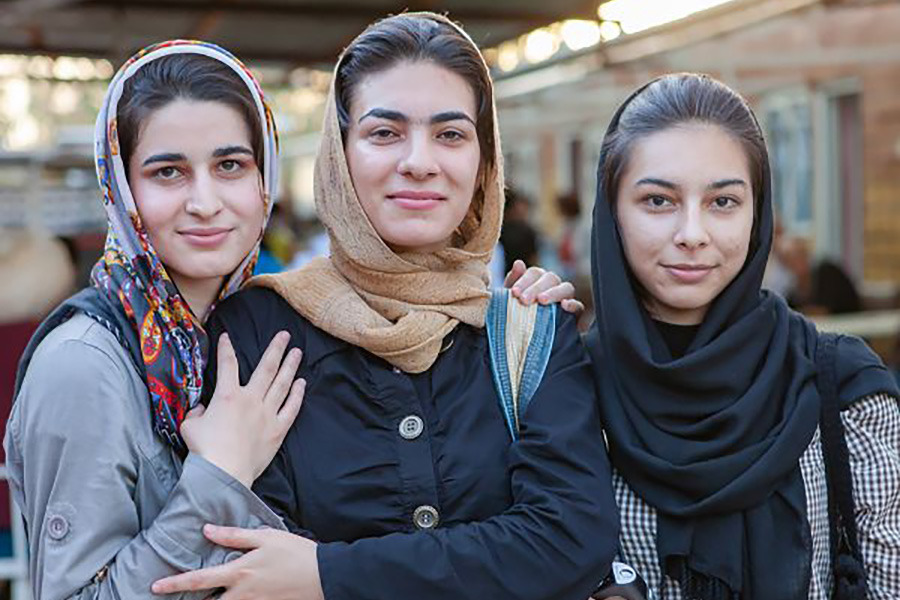
𐤌𐤃 (Mad) and 𐤐𐤓𐤎 (Pharas)
𐤌𐤃𐤉𐤌 (Madayam) and 𐤐𐤓𐤎𐤉𐤌 (Parasayam)
Persians and non-Melanated Indians

𐤉𐤅𐤍 (Yauan)
𐤉𐤅𐤍𐤉𐤌 (Yauanayam)
Greeks
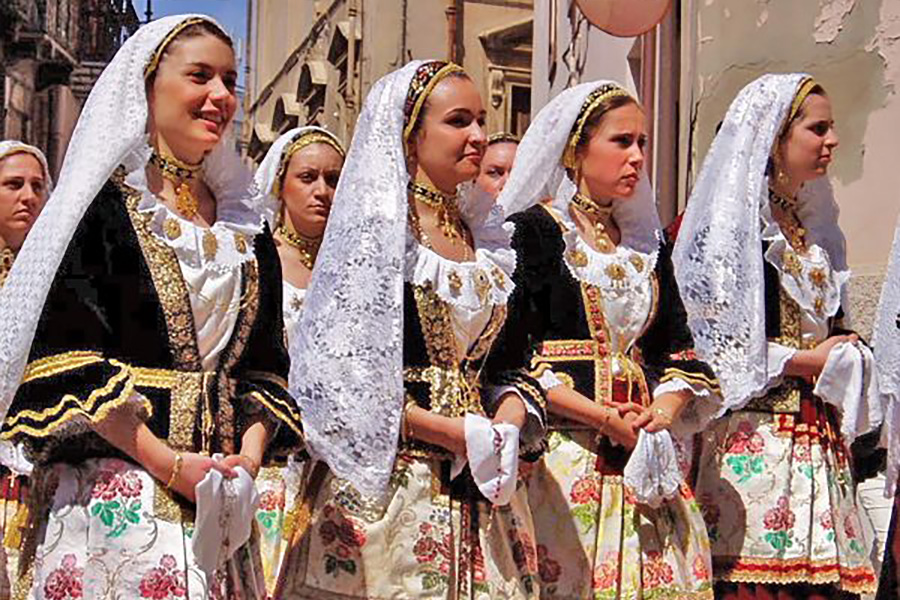
𐤊𐤕 (Kat) and 𐤕𐤉𐤓𐤎 (Tayaras)
𐤊𐤕𐤉𐤌 (Katayam) and 𐤕𐤉𐤓𐤎𐤉𐤌 (Tayarasayam)
Romans and Italians

𐤕𐤅𐤁𐤋 (Tauabal) and 𐤌𐤔𐤊 (Mashak)
𐤕𐤅𐤁𐤋𐤉𐤌 (Tauabalayam) and 𐤌𐤔𐤊𐤉𐤌 (Mashakayam)
Russians

𐤓𐤉𐤐𐤕 (Rayaphat)
𐤓𐤉𐤐𐤕𐤉𐤌 (Rayaphatayam)
Europeans and British

𐤕𐤓𐤔𐤉𐤔 (Tarashayash)
𐤕𐤓𐤔𐤉𐤔𐤉𐤌 (Tarashayashayam)
Spainards
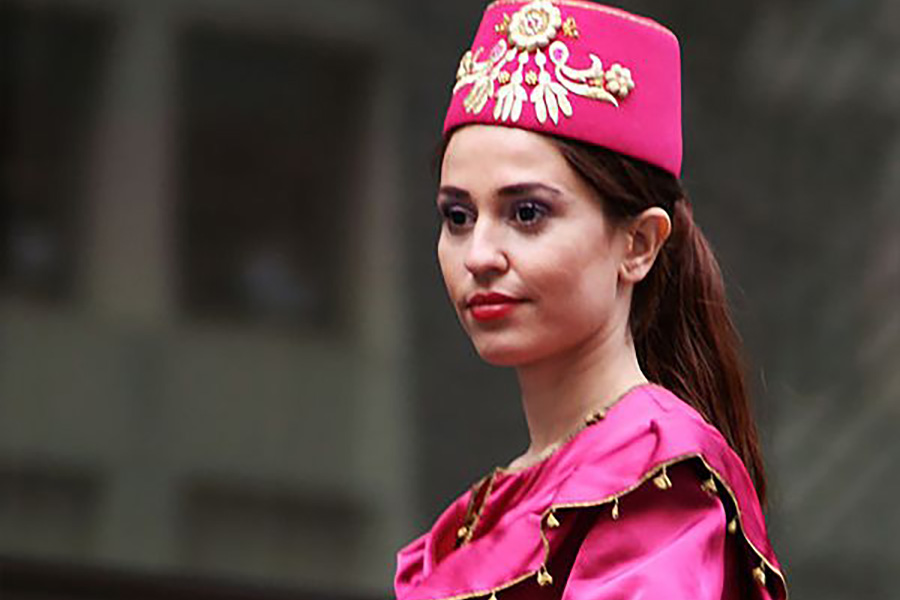
𐤕𐤅𐤂𐤓𐤌𐤄 (Tauagaramah)
𐤕𐤅𐤂𐤓𐤌𐤄𐤉𐤌 (Tauagaramahayam)
Turkish
Definitions for 𐤉𐤐𐤕𐤉𐤌 / yaphatayam
When adding the 𐤌 (mayam) after the 𐤉 (yad) to the end of a word, it creates a plural of the original word. It can identify multiple members of a nation. For example, 𐤏𐤁𐤓 (Ābar) is the progenitor, but 𐤏𐤁𐤓𐤉𐤌 (Ābarayam) are the plural descendants of him also known as Hebrews.
| Language | Word | Transliteration | Pronunciation | Definition |
|---|---|---|---|---|
| Ābarayat | 𐤉𐤐𐤕𐤉𐤌 | yaphatayam | yah’-fata-yawm | |
| English | Japhethites | Japhethites | jey-fith -ahytes | a member of any of various ancient and modern peoples |
| Hebrew | ||||
| Arabic | ||||
| Greek |
Images for 𐤉𐤐𐤕𐤉𐤌 / yaphatayam


Definitions for 𐤉𐤐𐤕𐤉𐤕 / yaphatayat
When adding the 𐤕 (tau) after the 𐤉 (yad) to the end of a word, it creates a plural of the original word. It identifies the language or a sign of a nation’s existence. For example, 𐤏𐤁𐤓 (Ābar) is the progenitor, but 𐤏𐤁𐤓𐤉𐤕 (Ābarayat) is the language of him also known as Paleo-Hebrew language.
| Language | Word | Transliteration | Pronunciation | Definition |
|---|---|---|---|---|
| Ābarayat | 𐤉𐤐𐤕𐤉𐤕 | yaphatayat | yah’-fata-yawt | Language of Yaphat. |
| English | Japhetic | Japhetic | juh-fet-ik | of or relating to Japheth. |
| Hebrew | ||||
| Arabic | ||||
| Greek |
Images for 𐤉𐤐𐤕𐤉𐤕 / yaphatayat
| Character | Name | Transliteration | Pronunciation |
|---|---|---|---|
Classification
You can continue your studies of the words by viewing Strong’s entries for:
